| Reviews & Columns |
|
Reviews DVD TV on DVD Blu-ray 4K UHD International DVDs In Theaters Reviews by Studio Video Games Features Collector Series DVDs Easter Egg Database Interviews DVD Talk Radio Feature Articles Columns Anime Talk DVD Savant Horror DVDs The M.O.D. Squad Art House HD Talk Silent DVD
|
DVD Talk Forum |
|
|
| Resources |
|
DVD Price Search Customer Service #'s RCE Info Links |
|
Columns
|
|
|
All in the Family - The Complete Ninth Season
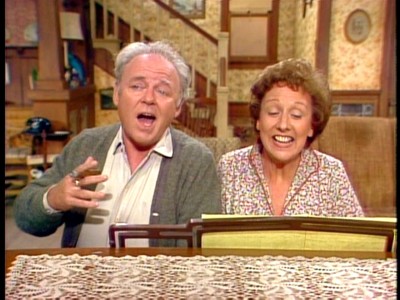
Some background for those younger viewers who may have not seen the show. 704 Hauser Street, Astoria, Queens, New York, 1978. World War II veteran, bar owner, and sometime all-American bigot Archie Bunker (Carroll O'Connor) looks about, and simply can not understand what has happened to his world. Besieged by the real horrors of life in 1970s New York City (crime, inflation, overcrowding, no job security, the breakdown of civility), and the imagined ones of his prejudices (anyone who isn't exactly like him in gender, race, religion, political and esthetic outlook is a threat), Archie is in a perpetual slow-burning fire of anxiety and quick-to-surface impotent rage. His "dingbat" wife, Edith (Jean Stapleton), is the opposite: the soul of kindness and understanding...when she does manage to understand what's going on around her. At first totally subservient to her husband, Edith has emotionally matured to the point where she now works on her own, and where she can stand up to Archie whenever his actions or opinions become too outrageous even for her Christian allowances (although...to be fair, Archie's outrageousness has considerably mellowed over time). With the source of Archie's biggest pain now gone (his pinko Commie son-in-law, Mike Stivic, has moved to California), as well as the source of his greatest pride, his "little girl" Gloria and his grandson Joey, there's room for one more in the Bunker household: little abandoned Stephanie Mills (Danielle Brisebois), a distant relative on Edith's side of the family.
PLOT SPOILERS WARNING!
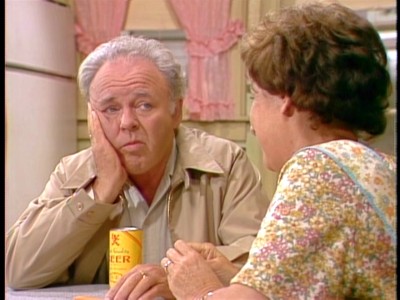
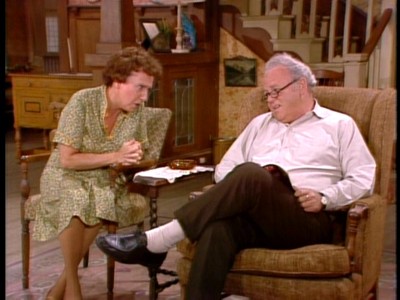
As I wrote in my eighth season review of All in the Family, regardless of the missteps in the series' later seasons when the Stivics were moved out of the Bunker household, the show went out on a high note when, after Rob Reiner and Sally Struthers failed to renew their contracts, the Stivics were moved out to California. The brilliance of that final episode, and particularly that final scene, when Edith and Archie, consumed and isolated in their own grief and loss as the camera pulls back, the Bunker household eerily silent for the first time, made up for any loss of the old fire All in the Family routinely delivered during its first five seasons. It was bad enough when the Stivics moved next door to the Bunkers, deflating the pressure-cooker atmosphere so expertly exploited in episode after episode. However, once the Stivics moved to California, the series' basic core was ripped out; All in the Family, for all intents and purposes, was over.
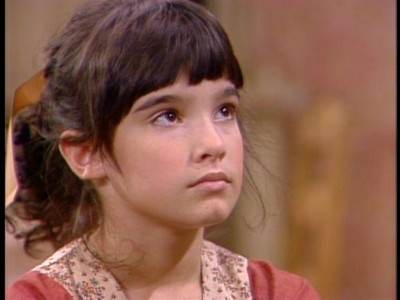
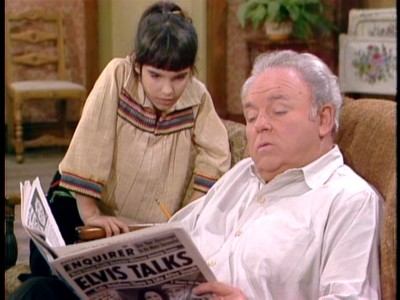
And by all aesthetic rights, All in the Family should have ended there. However, CBS and Carroll O'Connor, then the highest paid actor in the history of television, had zero intention of quitting the still stellar-performing series (it ranked 6th overall for that eighth year during the 1977-1978 season), so this ninth season was produced. First...let me just broadly generalize here and admit that regardless of the quality of the scripts here and the validity of the series' new premise (middle-aged Bunkers start again by raising a child), Carroll O'Connor as Archie is always going to be at the very least, funny (as is the equally talented Jean Stapleton as Edith). And, if gauged by fulfilling the sitcom genre's most basic requirement―making a viewer laugh more than he doesn't―then All in the Family's ninth season is a success. Case closed, as Archie would say. Is O'Connor as sharp and on fire as he was back during the show's pop culture heyday? No. Is his material as good? Decidedly not. Does the show still have the ability to shock us? By this point, not at all. However...you will laugh, more often than not, during most of the episodes from this 1978-1979 season (due mostly to the expertise of the cast), and that's enough of a recommendation for any TV show.
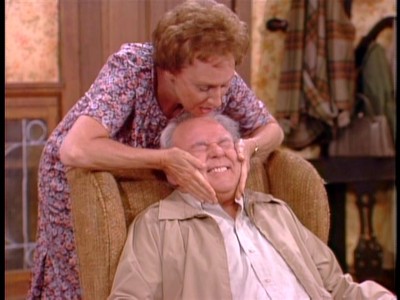
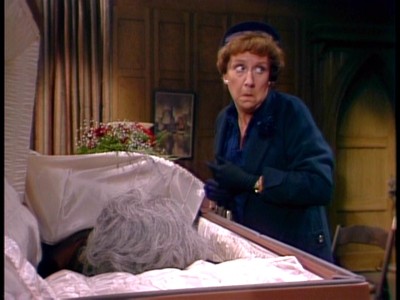
However...it is rather sad and distressing to see a show that once defined the very cutting edge of modern television programming, reduced to a sometimes cute, sometimes exceedingly ordinary sitcom. This All in the Family isn't the All in the Family that ruled the ratings' roost in the early 70s, and had the entire country talking. That All in the Family was loud and vulgar and crass and breathtakingly alive in its daring, in its willingness to offend, to shock. This later All in the Family, though, can often look like any other number of mismatched parenting sitcoms that have aired, while coming off as nothing more than a pale imitation of its original self when it fitfully tries to recapture its old magic.
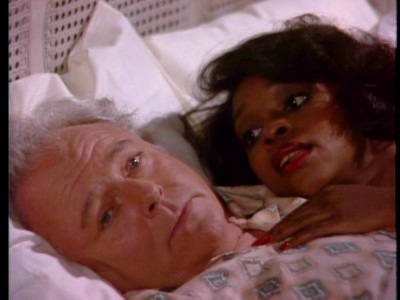
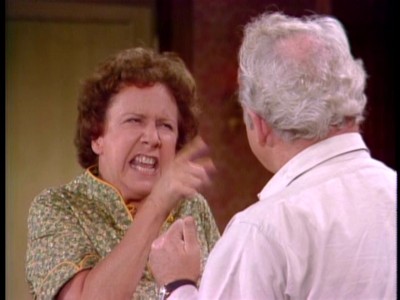
Of course, the biggest change this season comes in the form of new Bunker lodger, Stephanie Mills (Danielle Brisebois), the nine-year-old daughter of Edith's "twice-removed step-cousin-in-law," Floyd Mills. Essentially abandoned by her alcoholic, shiftless father (and later "sold" to the Bunkers in a pathetic extortion bid), the adorable Stephanie is immediately welcomed into the household by sweet, loving Edith, while yelling, grumbling Archie wants her out...until, touched by her plight, he finally, grudgingly, relents. While certainly not a new ploy by any means (TV series, in search of new ratings' blood when young castmates grow up, had been doing this since they began), the notion of bringing in a younger child into the Bunker TV household does open up quite a few comedic possibilities now that the child/parent dynamic is gone with the absence of the Stivics. And Brisebois is an uncommonly good child actor, with a sweet, open, natural approach to her scenes that makes her the genetic opposite of those soulless little automatons we see on so many shows, with their grotesque muggings and overproduced, rim-shot mentalities (see anything currently on Nick or The Disney Channel).
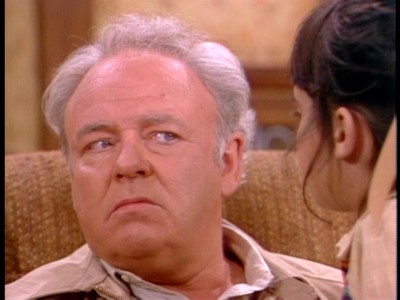
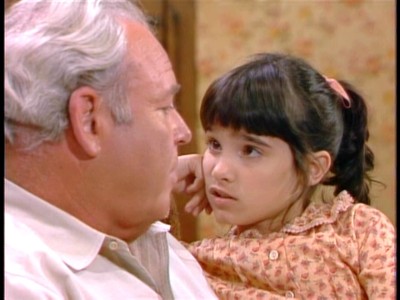
With another little girl in the house, and Archie mellowed by age and experience, we get a chance to see the sweet, loving Archie character as he may have been with his own daughter Gloria all those years ago―an underlying subtext throughout the series, often referred to in previous episodes. O'Connor and Brisebois, and Brisebois and Stapleton, are magic together, with Stapleton so kind and understanding and patient in her scenes where she reassures the nervous Stephie that she won't ever be abandoned again, and with O'Connor expertly mining the curmudgeonly sentiment that frequently pops up when doe-eyed, loving Brisebois breaks through Archie's crusty shell. In the season's second episode, End in Sight, O'Connor, without a trace of sentiment, tells sweet little Stephie, "Go and help your Aunt Edith set the table, ya little dingbat, ya," and the effect is hilarious precisely because we know, deep down, that Archie has been moved by this little girl who needs a real family, with real, normal, routine family commitments...like setting the table. It's a marvelous moment, much like the one in the premiere episode, Little Miss Bunker, where Brisebois' expressive little face lights up with love at the simple offer of a nap from heartbroken Edith. These scenes between O'Connor, Stapleton and Brisebois are clearly the best elements of this ninth season.
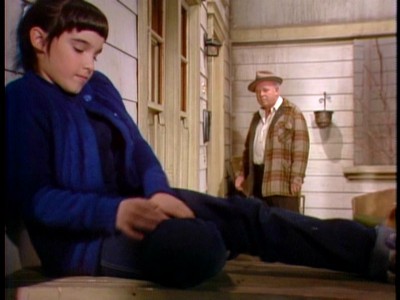

If All in the Family had focused more on that story arc―scenes in the Bunker household as this middle-aged couple unexpectedly raise a young child―it may have been more successful overall as a season...even if this story development, no matter how appealing, was superfluous to the original intent of the series. Unfortunately, there are surprisingly few episodes devoted entirely to Stephanie and the Bunkers (only six), with mere drop-ins here and there for Stephanie throughout the rest. The remaining episodes consist of warmed-over treatments of previous All in the Family shows (for example, this season's Edith's Final Respects is just a do-over of Cousin Liz...which was already a do-over of Stretch Cunningham, Goodbye), along with surprisingly innocuous, almost vapid sitcom-y stories like Weekend in the Country, with familiar hijinks involving bed-partners at Barney Hefner's (Allan Melvin) cabin, or Bogus Bills, a tired treatment of the standard counterfeit bills storyline. Season Nine of All in the Family is all over the place in terms of focus, with the core writers clearly scrabbling to find some kind of definitive voice for a series that really doesn't have a reason to exist anymore.
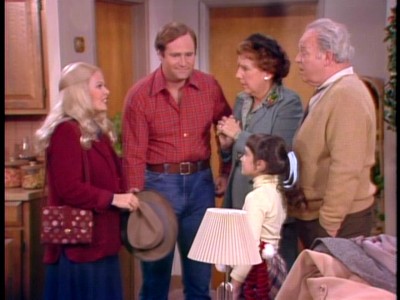
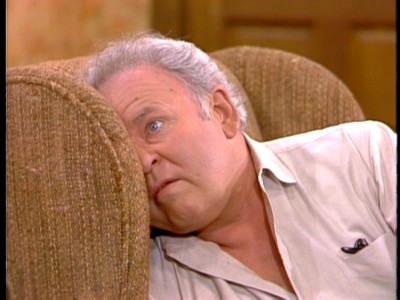
A couple of episodes this season come close to reminding us of the series' glory days―at least in terms of attempting to say something significant about a current sociological or political issue. Edith Versus the Bank finds an increasingly angry Edith discovering the discriminatory practices of lending institutions when a "mere" housewife is the lendee (Stapleton gets a chance to really rage at a dismissive O'Connor here, and she's terrific). And Stephanie's Conversion, where Archie and Edith discover that Stephie was originally being raised Jewish, hints at possibilities we can only dream of, had this episode come out four years earlier (Archie's acceptance of the situation, while gratifying, is entirely without conflict...so what's the point?). Edith Gets Fired is a beautifully-acted episode by Stapleton which explores Edith's culpability when she lets a patient at the Sunshine Home die with dignity. And the hour-long California, Here We Are puts a final coda on the Stivics' separation from the Bunkers, when Edith and Archie discover that all isn't well with Gloria's and Mike's marriage (it's fun to see the original cast together again in this funny, energetic episode). As good as these episodes are, though, they are but faint reminders of how the series crackled and hummed with similarly-themed outings; they serve only to jog our memory about how great All in the Family used to be.

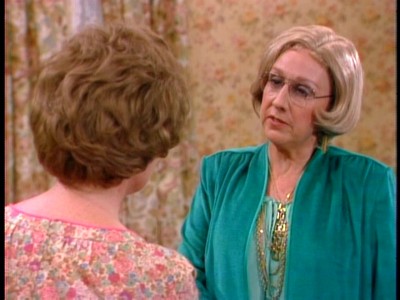
Far too often, the remaining episodes from this ninth and final season point to a diffused and played-out concept. Reunion on Hauser Street and Barney, The Gold Digger, along with Weekend in the Country, inexplicably focus on the frankly uninteresting Barney Hefner character (sure Melvin is funny...but I don't want to watch him for a full episode as Hefner). Archie's Other Wife, where Pinky Peterson (Eugene Roche) plays a gag on Archie, making him think he married a black stewardess, is just another late-series attempt to milk a ridiculous, far-fetched plot within the "Archie is a bigot" framework―a comedic framework that yields ever-decreasing returns because clearly, Archie isn't portrayed as that much of a bigot anymore. Return of the Waitress (with Archie's almost-mistress, Janice Paige), A Girl Like Edith (with Edith's almost-boyfriend, Theodore Bikel), and Return of Archie's Brother, are tiresome retreads of previous episodes, while The Family Next Door is probably this season's most egregious example of the series' exhausted premise: Archie is yet again irate over a black couple moving in next door (how many times did the producers think they could re-work that premise before the viewers had had enough?). Even the season's―and series'―final episode, Too Good Edith, is distressingly tepid, with perhaps an early foreshadowing of what was to eventually become of the Edith character when Stapleton moved on from Archie Bunker's Place, and a last, old-fashioned iris fade-out on Archie and Edith in bed, declaring their love for each other, which is surprising only in how little it resonates, considering this is the "end" of a truly iconic show (compare it to the fade-out when the Stivics leave for good in season eight).
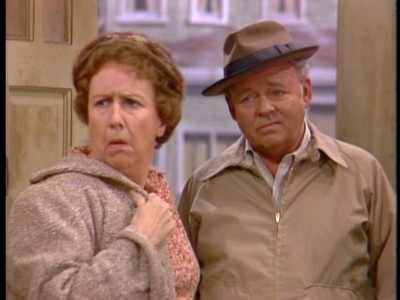
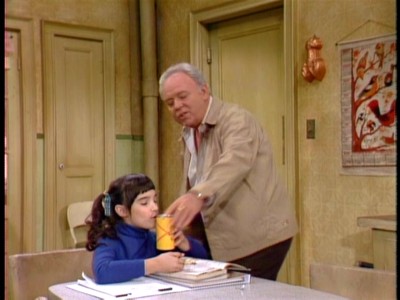
Then again...what do I know? Apparently, the viewing public of 1978-1979 had no such qualms about the course of All in the Family's aesthetic development: they embraced this season of change with surprisingly little ratings' erosion. Now granted, All in the Family wasn't pulling in the remarkable percentage of homes it routinely did during its heyday (some of those earlier episodes pulled 40 to 50 percent shares of viewing households, with a yearly average of around 35 percent)...but 24.9 percent of all homes with TVs was still amazing for a show nine years old. Even more remarkable, considering the potentially devastating loss of core cast members Rob Reiner and Sally Struthers, was All in the Family's victory over the single most hyped TV event of the 1978-1979 season: ABC's premiere of its Star Wars knock-off, Battlestar Galactica. Premiering at 8:00pm on Sunday nights, Battlestar Galactica's direct competition on CBS was Mary, former CBS queen Mary Tyler Moore's disastrous excursion into the comedy/variety genre. Canceled after only a couple of episodes, CBS moved All in the Family from its safe 9:00pm slot to Mary's 8:00pm slot, where the veteran sitcom proceeded to bury ABC's expensive sci-fi fizzle, aided by All in the Family's strong 8:30pm lead-out, Alice (13th for the year). Little direct, sustained competition faced All in the Family over on NBC, which threw up the umbrella Big Event two-hour slot that could host a miniseries like Centennial one week...and failed sitcom pilots the next. Despite the cast and format change, despite the softening of the Archie character, despite All in the Family not really being All in the Family, this ninth season garnered an impressive rating as the ninth most popular show of the 1978-1979 year, illustrating the continued affection its massive core audience held for the once-controversial series...an affection that would hold over, as well, for All in the Family's spin-off series, Archie Bunker's Place.
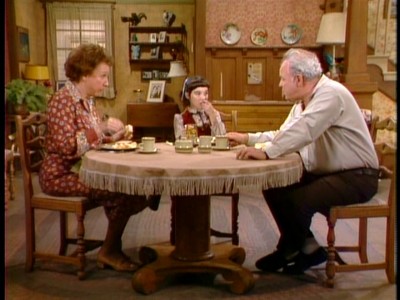
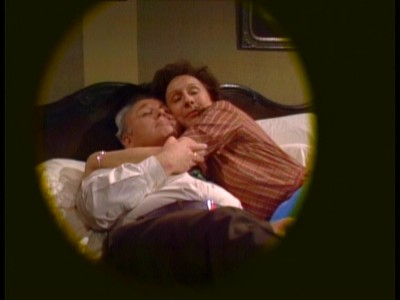
The DVD:
The Video:
Allowing for Norman Lear's deliberately cheap video look, the full-screen, 1.33:1 video transfers for All in the Family: The Complete Ninth Season look as good as they can, with blown-out lighting, muddy color, and occasional flaring. Still...it looks exactly the way it did 30-some-years-ago.
The Audio:
The English mono audio track is transferred at a solid level, with all dialogue heard clearly. Hiss from the original elements can be heard, but it's not distracting. Close-captions are available.
The Extras:
Technically not an "extra" (it's included, properly so, in episode airing order on disc three), it is fun to see the 200th episode retrospective, hosted by Norman Lear and held at the Mark Taper Forum at the Music Center in Los Angeles, particularly since I would imagine it wasn't aired in syndication. Evidently, CBS held a contest of some sort back in '78, and couples from all 48 states (screw Alaska and Hawaii, apparently, because of the air fare) are flown in to watch the clip show and later eat and dance uncomfortably with the clearly put-upon cast members. Lear as host is annoying, as expected, with his usual humorless lectures filled with questionable assertions ("There's nothing new in using the Bible to rationalize bigotry," he asserts―a claim that may be true, if overstated and generalized to the point of uselessness, and if one ignores the overwhelming good will that has been done in the name of said book...and that's coming from an unbeliever), and his sometimes unintentionally laughable observations, made ironic by the passage of time (I love it when he pleads for television to remain a voice for unfettered free speech, free speech used to shock and move an audience―a plea which is fine today with Lear's fellow liberals...as long as it's "politically correct" free speech, and the jokes are solely at the expense of conservative, traditional America). But really, the best part of the show is obviously the terrific selection of clips, and the all-too brief glimpses of the after-party during the end credits, where a variety of hayseeds, normal folk and some obvious freaks hang out with the startled cast (god would I have loved to have been a fly on the wall at that party).
Final Thoughts:
A totally unnecessary―but still funny―end to an iconic series. Sure, All in the Family will morph into Archie Bunker's Place the following year, and yes, it is very sweet to see the delightful Danielle Brisebois interact with a clearly charmed Stapleton and O'Connor. However...this ain't the real All in the Family. I'm recommending All in the Family: The Complete Ninth Season for completists. Now let's hope Shout! puts out the rest of Archie Bunker's Place.
Paul Mavis is an internationally published film and television historian, a member of the Online Film Critics Society, and the author of The Espionage Filmography.


|
| Popular Reviews |
| Sponsored Links |
|
|
| Sponsored Links |
|
|
| Release List | Reviews | Shop | Newsletter | Forum | DVD Giveaways | Blu-Ray | Advertise |
|
Copyright 2024 DVDTalk.com All Rights Reserved. Legal Info, Privacy Policy, Terms of Use,
Manage Preferences,
Your Privacy Choices | |||||||













